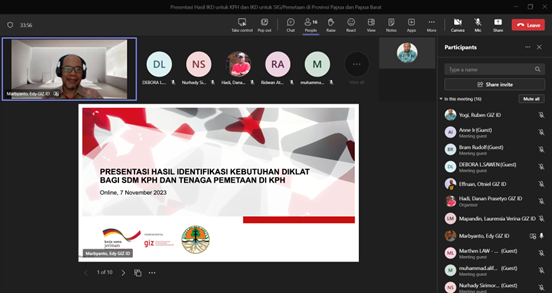
To promote better forest management (particularly in terms of planning-related aspects), as implemented by Forest Management Units (KPH) in Papua Province, FORCLIME, working in conjunction with the Papua Province Forestry and Environment Service (DKLH), has completed two Training Needs Assessments (TNA). The first of these TNA was organized in order to support the competency of the human resources working at KPH in Papua and West Papua Provinces and was held in September of last year. Meanwhile, a second TNA that addressed the field of Geographical Information Systems (GIS) was organized for the staff working at DKLH, as well as the Papua Natural Resources Conservation Center (BBKSDA), and was held in August 2023.
The results of the two TNA were presented online on 7 November 2023 during a session that was attended by structural officials and staff members who currently occupy positions or who are projected to occupy positions within the Forest Planning and Mapping sections of DKLH, including KPH, and BBKSDA Papua. The session was moderated by Edy Marbyanto, FORCLIME’s Human Capacity Development Manager.
In his opening remarks, the Head of the Papua DKLH’s Forestry Development Planning Department, Mr. Ridwan Atmojo, ST., M.Si., explained that in terms of forest management, KPH are currently facing several obstacles due to their limited human resources, particularly in terms of GIS that are capable of supporting the preparation of forest management plans (RPHJP).
The results of the TNA on the competency of the human resources of KPH were presented by Muhammad Alif K. Sahide, a consultant from the Community Forestry Communication Forum (FKKM). Meanwhile, the TNA results that addressed GIS and Mapping were presented by Danan P. Hadi, a GIS/Remote Sensing and eLearning Advisor from FORCLIME.
The ensuing discussion resulted in the following general conclusions: (1) The majority of KPH operating in Papua suffer from limited human resources, budgets and infrastructure; (2) Efforts to increase the capacities of the human resources of KPH should focus on the planning stage, including the preparation of RPHJP that address forest use planning, forest inventories, socio-economic inventories and data management; (3) The specifications of work facilities need to be adjusted to match regional financial capabilities and working requirements. Moreover, in terms of mapping departments, open-source software that has been tested can be utilized; (4) The development of more intensive cooperation between DKLH Papua and technical implementing units at the Ministry of Environment and Forestry in Papua will be vital in order to develop the capacities of the relevant human resources.
As a follow-up to this activity, a discussion has been scheduled that will address plans for the implementation of training sessions in accordance with real needs out in the field and based on recommendations that are made in the wake of the TNA results.
For more information, please contact:
Danan P. Hadi, Advisor for Remote Sensing/GIS and eLearning
Edy Marbyanto, Strategic Area Manager for Human Capacity Development






